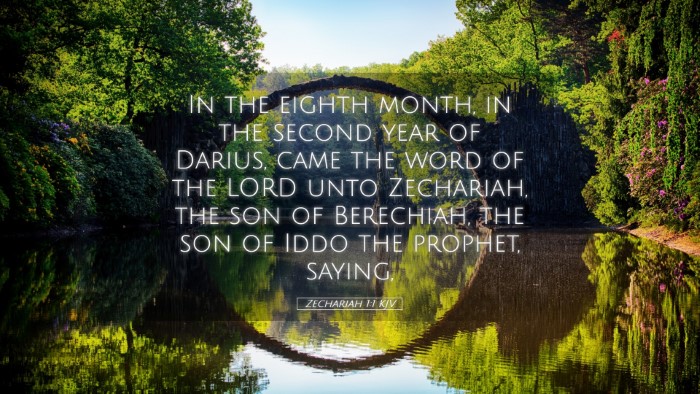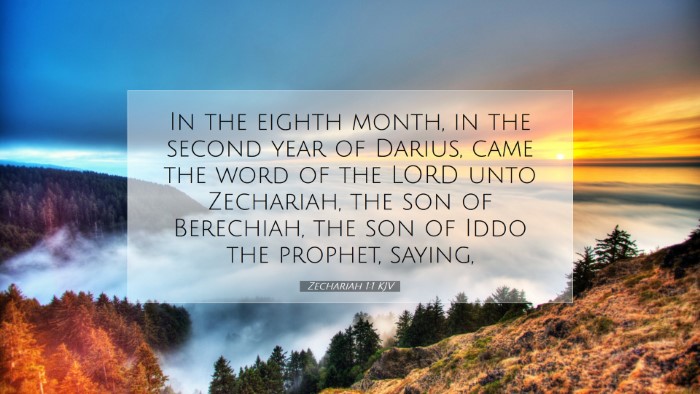Commentary on Zechariah 1:1
Verse Context: Zechariah 1:1 states, "In the eighth month, in the second year of Darius, came the word of the LORD unto Zechariah, the son of Berechiah, the son of Iddo the prophet, saying."
Introduction
The Book of Zechariah is a vital prophetic text that reveals God's intentions and plans for His people in a post-exilic context. The opening verse is significant as it establishes the timing, the recipient of the message, and the divine source of prophetic revelation. This first verse not only introduces the prophet but also sets the stage for the themes of restoration and hope that permeate the book.
Timing of the Prophecy
Historical Context: The verse provides a precise historical reference: "In the eighth month, in the second year of Darius." This situates the prophetic messages during the Persian period, after the return from Babylonian exile. Matthew Henry emphasizes that such dating helps to authenticate the prophecy, grounding it in real historical events as a backdrop to God’s promises and expectations for His people.
The Prophet
Identity of Zechariah: Zechariah, described as the son of Berechiah, and the grandson of Iddo, is pivotal to understanding the continuity of prophetic tradition within Israel. Adam Clarke notes that the lineage mentioned not only establishes Zechariah’s credentials as a prophet but connects him to past prophetic voices. This genealogy links him to the historical heritage of the Jewish people, suggesting both authority and credibility in his role as God’s spokesperson.
The Divine Communication
“Came the word of the LORD”: This phrase encapsulates the essence of prophetic ministry—the divine initiative in communication with humanity. Albert Barnes writes that this expression highlights the divine origin of the message, establishing that Zechariah’s prophecies are not merely personal reflections, but are rooted firmly in God’s will and purpose for Israel. The repetition of "the word of the LORD" throughout the Bible signifies the critical nature of divine revelation.
Thematic Implications
The introduction of the prophetic word sets forth key themes of the book that are crucial for understanding God’s relationship with His people:
- Restoration: The messages given to Zechariah often center around Israel's restoration both spiritually and physically. They encourage the people to rebuild the temple and re-establish their identity as God’s chosen people.
- Hope: In a time of discouragement, Zechariah’s prophecies provide a vision of hope, underscoring that despite their current circumstances, God has a future plan for His people.
- Divine Sovereignty: The verses emphasize God’s sovereignty over nations, reaffirming His control not only over Israel but over the entire world, thus encouraging His people to trust in His governance.
Theological Reflections
From a theological perspective, Zechariah's opening passage prompts discussion on the nature of prophecy:
- The Authority of Scripture: The prophetic messages underscore the belief that Scripture is divinely inspired, with God's word carrying authority over human understanding. This places a responsibility on believers to heed the messages delivered through prophets.
- God’s Desire for Relationship: This passage illustrates God’s ongoing desire to communicate and relate to His people, which serves as a foundational principle in understanding covenant theology.
- Integration of Historical and Spiritual Realities: As noted by Matthew Henry, the intersection of historical events with God's prophetic voice reminds readers that God is actively involved in the unfolding of history to fulfill His divine purposes.
Conclusion
Zechariah 1:1 is rich with meaning, establishing a framework for the messages that follow. It captures a moment in history where God actively communicates through His chosen prophet, Zechariah, signaling His plans for restoration, hope, and the reaffirmation of covenant relationship with His people. For pastors, students, theologians, and Bible scholars, this initial verse encourages a deep engagement with the text, prompting us to reflect on how God continues to speak into our lives and circumstances today.


